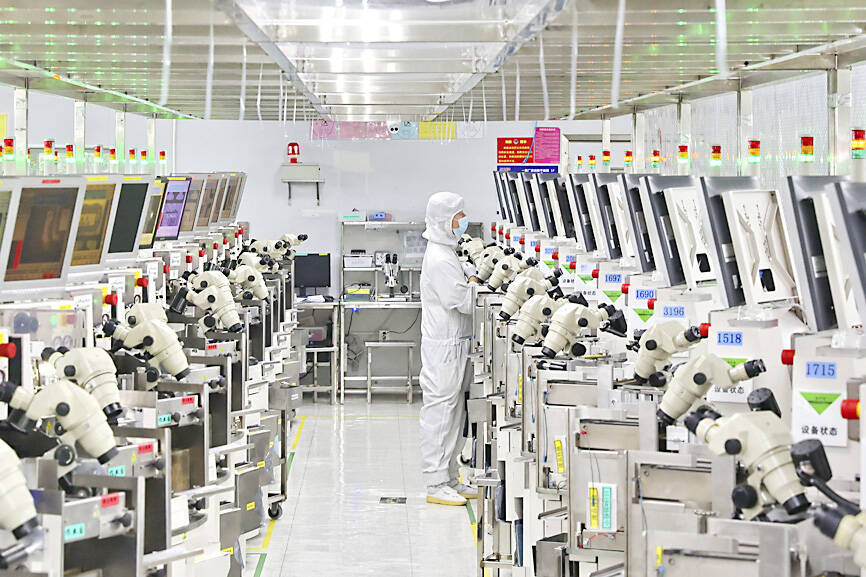Beijing has set out to extend its domestic laws across international borders with a ban on selling some goods to the US that applies to companies both inside and outside China.
The new export control rules are China’s first attempt to replicate the extraterritorial reach of US and European sanctions by covering Chinese products or goods with Chinese parts in them. In an announcement this week, China declared it is banning the sale of dual-use items to the US military and also the export to the US of materials such as gallium and germanium.
Companies and people overseas would be subject to those restrictions, the Chinese Ministry of Commerce said on Tuesday. “Any organization or individual from any country or region that violates the above provisions and transfers or provides relevant dual-use items originating in the People’s Republic of China to organizations or individuals in the United States will be held accountable according to law.”

Photo: AP
The decision marks the first time China is employing controls that extend to products with both civilian and military uses. The rules went into effect on Sunday and allow for application similar to the US Export Administration Regulations, according to a report from the law firm Covington & Burling, which noted that there are “few details” on when this extraterritoriality would be invoked.
The precedent-setting move amounts to an escalation with the US weeks before US president-elect Donald Trump takes office.
China is the top global supplier of dozens of critical minerals, and concerns about its dominance have been mounting in Washington since Beijing placed initial controls on exports of gallium and germanium last year.
“I’m not aware of another such case under the current regulatory regime,” said Cory Combs, an associate director at research firm Trivium China. “For companies, the extraterritorial application means they shouldn’t bank on any loopholes to keep supplies flowing. Simply put, companies using the affected inputs need to find alternative supplies ASAP.”
The new provisions build on earlier language in the 2020 export control legislation, which also said that the law applied to individuals or organizations inside or outside of China, Combs said.
In recent years, the Chinese government has been strengthening its toolbox to push back against US sanctions and trade controls, creating the “Unreliable Entity List” and “Export Control Law” in 2020 and the “Anti-Foreign Sanctions Law” in 2021.
It also passed a National Security Law for Hong Kong, which claimed jurisdiction over acts committed outside China’s territories.
While the new formulations in the rules are concerning, “we don’t yet have a clear consensus view on how far Beijing might go to investigate or punish third countries suspected of prohibited re-exports,” Combs said.
“The language primarily serves to close the potential loophole for domestic firms to try to reroute exports as opposed to seeking a new avenue to punish third countries,” he said.
“Beijing’s new export controls will likely fall short of Washington’s in international surveillance, compliance and enforcement. Beijing’s statement vaguely threatens countries that help the US evade the controls,” Gerard DiPippo, Maeva Cousin and Nicole Gorton-Caratelli of Bloomberg Economics said.

Vincent Wei led fellow Singaporean farmers around an empty Malaysian plot, laying out plans for a greenhouse and rows of leafy vegetables. What he pitched was not just space for crops, but a lifeline for growers struggling to make ends meet in a city-state with high prices and little vacant land. The future agriculture hub is part of a joint special economic zone launched last year by the two neighbors, expected to cost US$123 million and produce 10,000 tonnes of fresh produce annually. It is attracting Singaporean farmers with promises of cheaper land, labor and energy just over the border.

US actor Matthew McConaughey has filed recordings of his image and voice with US patent authorities to protect them from unauthorized usage by artificial intelligence (AI) platforms, a representative said earlier this week. Several video clips and audio recordings were registered by the commercial arm of the Just Keep Livin’ Foundation, a non-profit created by the Oscar-winning actor and his wife, Camila, according to the US Patent and Trademark Office database. Many artists are increasingly concerned about the uncontrolled use of their image via generative AI since the rollout of ChatGPT and other AI-powered tools. Several US states have adopted

A proposed billionaires’ tax in California has ignited a political uproar in Silicon Valley, with tech titans threatening to leave the state while California Governor Gavin Newsom of the Democratic Party maneuvers to defeat a levy that he fears would lead to an exodus of wealth. A technology mecca, California has more billionaires than any other US state — a few hundred, by some estimates. About half its personal income tax revenue, a financial backbone in the nearly US$350 billion budget, comes from the top 1 percent of earners. A large healthcare union is attempting to place a proposal before

KEEPING UP: The acquisition of a cleanroom in Taiwan would enable Micron to increase production in a market where demand continues to outpace supply, a Micron official said Micron Technology Inc has signed a letter of intent to buy a fabrication site in Taiwan from Powerchip Semiconductor Manufacturing Corp (力積電) for US$1.8 billion to expand its production of memory chips. Micron would take control of the P5 site in Miaoli County’s Tongluo Township (銅鑼) and plans to ramp up DRAM production in phases after the transaction closes in the second quarter, the company said in a statement on Saturday. The acquisition includes an existing 12 inch fab cleanroom of 27,871m2 and would further position Micron to address growing global demand for memory solutions, the company said. Micron expects the transaction to